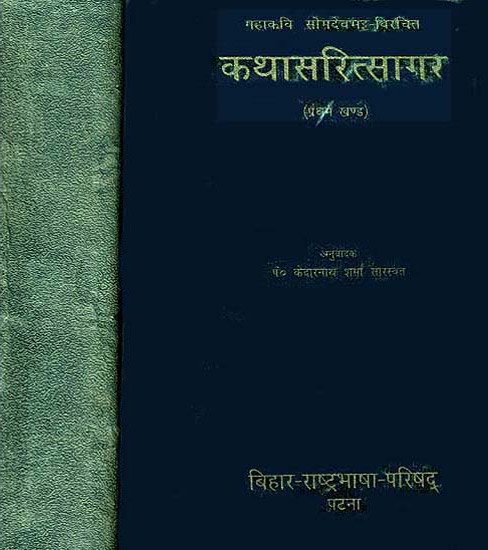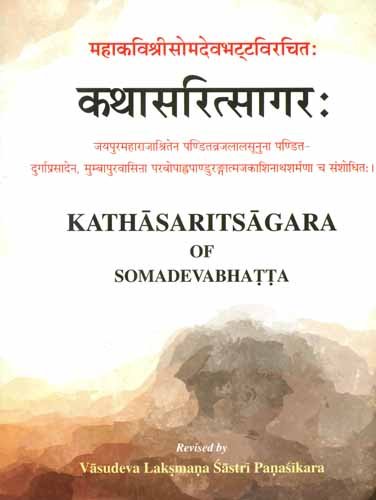Kathasaritsagara [sanskrit]
by C. H. Tawney | 2014 | 226,424 words | ISBN-13: 9789350501351
The Sanskrit edition of the Kathasaritsagara referencing the English translation and grammatical analysis. Written by Somadeva and dating from the 12th century, the Kathasaritsagara (or Katha-sarit-sagara) represents an epic legend narrating the adventures of Naravahanadatta as he strives to become the destined emperor of the Vidyadharas. Alternative titles: (Kathāsaritsāgara, कथासरित्सागर, Kathā-sarit-sāgara)
Verse 12.35.152
ततः स्वाम्यादेशप्रबलपवनापातविधुतो बलाम्भोधिर् धावन् नरतुरगमातङ्गमकरः ।
सपक्षाणां तन्वन् मनसि परितोषं क्षितिभृतां स संप्राप क्षोभं प्रतिभयकरं कातरनृणाम् ॥ १५२ ॥
tataḥ svāmyādeśaprabalapavanāpātavidhuto balāmbhodhir dhāvan naraturagamātaṅgamakaraḥ |
sapakṣāṇāṃ tanvan manasi paritoṣaṃ kṣitibhṛtāṃ sa saṃprāpa kṣobhaṃ pratibhayakaraṃ kātaranṛṇām || 152 ||
The English translation of Kathasaritsagara Verse 12.35.152 is contained in the book The Ocean of Story by C.H. Tawney. This book is available online or you could buy the latest edition:
Read online Buy now! The English translation by C.H. Tawney (2014)
Glossary of Sanskrit terms
Note: This extracts Sanskrit terms and links to English definitions from the glossary, based on an experimental segmentation of verse (12.35.152). Some terms could be superfluous while some might not be mentioned. Click on the word to show English definitions.
Tatah, Tad, Tata, Svamin, Svamya, Adesha, Prabala, Pavana, Pata, Vidhuta, Bala, Bha, Bhu, Dhi, Dhavat, Nara, Turaga, Anga, Akara, Sapaksha, Tanvat, Manas, Manasin, Paritosha, Kshitibhrit, Prapa, Kshobha, Pratibhayakara, Katara, Nri,
Analysis of Sanskrit grammar
Note: this is an experimental feature and only shows the first possible analysis of the Sanskrit text (Kathasaritsagara Verse 12.35.152). If the system was successful in segmenting the sentence, you will see of which words it is made up of, generally consisting of Nouns, Pronouns, Verbs, Participles and Indeclinables. Click on the link to show all possible derivations of the word.
- Line 1: “tataḥ svāmyādeśaprabalapavanāpātavidhuto balāmbhodhir dhāvan naraturagamātaṅgamakaraḥ ”
- tataḥ -
-
tataḥ (indeclinable adverb)[indeclinable adverb]tataḥ (indeclinable correlative)[indeclinable correlative]tataḥ (indeclinable)[indeclinable]tad (noun, neuter)[ablative single], [ablative dual], [ablative plural]tata (noun, masculine)[nominative single]√tan -> tata (participle, masculine)[nominative single from √tan class 8 verb]sa (noun, masculine)[ablative single], [ablative dual], [ablative plural]sā (noun, feminine)[ablative single], [ablative dual], [ablative plural]
- svāmyā -
-
svāmin (noun, masculine)[compound], [adverb], [nominative single]svāmya (noun, neuter)[compound], [vocative single]
- ādeśa -
-
ādeśa (noun, masculine)[compound], [vocative single]
- prabala -
-
prabala (noun, masculine)[compound], [vocative single]prabala (noun, neuter)[compound], [vocative single]
- pavanā -
-
pavanā (noun, feminine)[nominative single]
- pāta -
-
pāta (noun, masculine)[compound], [vocative single]pāta (noun, neuter)[compound], [vocative single]√pā (verb class 2)[imperative active second plural]√pā (verb class 2)[imperative active second plural]
- vidhuto* -
-
vidhuta (noun, masculine)[nominative single]
- balām -
-
balā (noun, feminine)[accusative single]
- bho -
-
bha (noun, masculine)[nominative single]bhā (noun, masculine)[accusative plural], [ablative single], [genitive single]bhu (noun, masculine)[vocative single]bhu (noun, feminine)[vocative single]
- dhir -
-
dhi (noun, masculine)[nominative single]
- dhāvan -
-
dhāvat (noun, masculine)[compound], [nominative single], [vocative single]dhāvat (noun, neuter)[nominative single], [vocative single], [accusative single]
- nara -
-
nara (noun, masculine)[compound], [vocative single]nara (noun, neuter)[compound], [vocative single]
- turagam -
-
turaga (noun, masculine)[adverb], [accusative single]
- āt -
-
āt (indeclinable particle)[indeclinable particle]a (noun, masculine)[adverb], [ablative single]
- aṅgam -
-
aṅga (noun, masculine)[adverb], [accusative single]aṅga (noun, neuter)[adverb], [nominative single], [accusative single]
- akaraḥ -
-
akara (noun, masculine)[nominative single]√kṛ (verb class 1)[imperfect active second single]
- Line 2: “sapakṣāṇāṃ tanvan manasi paritoṣaṃ kṣitibhṛtāṃ sa saṃprāpa kṣobhaṃ pratibhayakaraṃ kātaranṛṇām ”
- sapakṣāṇām -
-
sapakṣa (noun, masculine)[genitive plural]sapakṣa (noun, neuter)[genitive plural]sapakṣā (noun, feminine)[genitive plural]
- tanvan -
-
√tan -> tanvat (participle, masculine)[nominative single from √tan class 8 verb], [vocative single from √tan class 8 verb]√tan -> tanvat (participle, neuter)[nominative single from √tan class 8 verb], [vocative single from √tan class 8 verb], [accusative single from √tan class 8 verb]
- manasi -
-
manasin (noun, masculine)[compound], [adverb]manasin (noun, neuter)[compound], [adverb], [nominative single], [vocative single], [accusative single]manas (noun, neuter)[locative single]√mnā (verb class 1)[present active second single]
- paritoṣam -
-
paritoṣa (noun, masculine)[adverb], [accusative single]
- kṣitibhṛtām -
-
kṣitibhṛt (noun, masculine)[genitive plural]
- sa -
-
sa (noun, neuter)[compound], [vocative single]sa (noun, masculine)[nominative single]
- sam -
-
sa (noun, neuter)[adverb], [nominative single], [accusative single]
- prāpa -
-
prāpa (noun, masculine)[compound], [vocative single]prāpa (noun, neuter)[compound], [vocative single]
- kṣobham -
-
kṣobha (noun, masculine)[adverb], [accusative single]
- pratibhayakaram -
-
pratibhayakara (noun, masculine)[adverb], [accusative single]pratibhayakara (noun, neuter)[adverb], [nominative single], [accusative single]pratibhayakarā (noun, feminine)[adverb]
- kātara -
-
kātara (noun, masculine)[compound], [vocative single]kātara (noun, neuter)[compound], [vocative single]
- nṛṇām -
-
nṛ (noun, masculine)[genitive plural]
Other editions:
Also see the following editions of the Sanskrit text or (alternative) English translations of the Kathasaritsagara Verse 12.35.152
Kathasaritsagar
by Kedarnath Sharma Saraswat (2005)
The Only Edition with the Sanskrit Text and its Hindi Translation (An Old and Rare Book) Set of 3 Vol.
Buy now!
Kathasaritsagara of Somadeva Bhatta (Sanskrit Text Only)
by Vasudeva Laksmana Sastri (2013)
Katha Sarit Sagar in Marathi
by H. A Bhave (1995)
Set of 5 Volumes; Published by Varada Books, Pune. 2256 pages (Throughout B/W Illustrations).
Buy now!
Katha Sarit Sagara (Tamil)
by S. V. Ganapati (எஸ். வி. கணபதி) (2014)
[கதா சரித் சாகரம்] Published by Alliance Publications.
Buy now!
Galpa Shono
by Abhijit Chattopadhyay (2014)
[গল্প শোনো] Galpa Shono: Bengali Translation of 'Suno Kahani From Katha Sarit Sagar'; 9788126015436; Published by Sahitya Akademi, Delhi.
Buy now!Preview of verse 12.35.152 in Bengali sript:
ততঃ স্বাম্যাদেশপ্রবলপবনাপাতবিধুতো বলাম্ভোধির্ ধাবন্ নরতুরগমাতঙ্গমকরঃ ।
সপক্ষাণাং তন্বন্ মনসি পরিতোষং ক্ষিতিভৃতাং স সংপ্রাপ ক্ষোভং প্রতিভযকরং কাতরনৃণাম্ ॥ ১৫২ ॥
![Kathasaritsagara [sanskrit] - book cover](/uploads/a/Katha-Sarit-Sagara.jpg)




